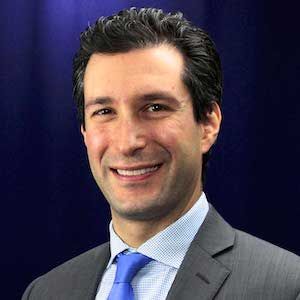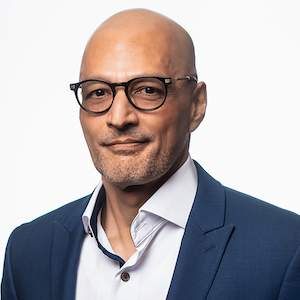News
Article
Retina Specialists Examine Avacincaptad Pegol for Geographic Atrophy
Author(s):
Last week's FDA approval of avacincaptad pegol marked the second approved treatment for geographic atrophy in 2023. Here, 4 retina specialists discuss the complement inhibitor and what it could represent for patients with GA.
Last week, the US Food and Drug Administration (FDA) approved avacincaptad pegol (IZERVAY) intravitreal solution for the treatment of geographic atrophy (GA) secondary to age-related macular degeneration (AMD).
Granted to Iveric Bio, the complement C5 inhibitor marks the second FDA-approved treatment for GA in 2023, following the approval of the complement C3 inhibitor pegcetacoplan injection (SYFOVRE) in February.
Here, the HCPLive team compiled perspectives from 4 retina specialists to gain insight into the newly-approved treatment for GA and what it may represent for patients with the devastating disease experiencing progressive vision loss.
Paul Hahn, MD, PhD
Credit: NJRetina

At the American Society of Retina Specialists (ASRS) 41st Annual Meeting, Paul Hahn, MD, PhD, a retina specialist at NJRetina, discussed the benefits of treatment choice with the newly approved complement inhibitors.
“Certainly, from a patient perspective, the more choices the better. It’s great to have options. From a physician's side, figuring out what drug we use makes it a little tricky. And there are a lot of factors that might factor into that. We have the PDUFA date, but we don’t have a label. So, we don’t know how this drug will be indicated. We don’t know how it can be used. From a pegcetacoplan standpoint, it’s nice to have the flexibility of dosing in the label of once every month and once every 2 months. I suspect that for avacincaptad pegol, which is only tested monthly, they will have a monthly indication for their label. But, in the real world, there are going to be so many different factors that play into how we decide which drug to use. And I think it’ll be interesting to see how that plays out.
“There’s strong evidence to suggest that complement inhibition plays an important role in geographic atrophy. So, with the approval of pegcetacoplan and these other drugs to come, there are a lot of different complement inhibitor targets and how each of these does in terms of efficacy and so forth remains to be seen—very exciting time. We have, really, for the first time, a treatment for geographic atrophy. As I tell patients, in the past, this was universally a blinding disease and there’s hope that we can figure this out."
Arshad Khanani, MD
Credit: Sierra Eye Associates

Also at ASRS 2023, Arshad Khanani, MD, the director of clinical research at Sierra Eye Associates, alluded to recent safety concerns with pegcetacoplan injection and the strong safety observed with avacincaptad pegol.
“Based on the GATHER1 and GATHER2 studies, the only 2 studies that met their primary endpoint in phase 3 pivotal GA trials looking at efficacy, we saw a treatment effect that was very quick and improved over time. The safety looks excellent. We didn’t see any retinal vasculitis or any other issues in the trial, so safety looks clean. I am hoping to have this option available for my patients in the near future.”
Carl Danzig, MD
Credit: Rand Eye Institute

At the 2023 Association for Research in Vision and Ophthalmology (ARVO) annual meeting, Carl Danzig, MD, the director of vitreoretinal services at Rand Eye Institute, spoke to the larger benefit of GA therapies and the need for improved communication with patients on treatment outcomes.
“I think this is wonderful for patients and physicians alike. We have a first-time approved FDA drug for GA with pegcetacoplan and we have potentially another drug with avacincaptad pegol. But, this opens up a conversation that we could not have previously. The earlier conversation with our patient was, you have a disease, we can’t treat it. We can do a clinical trial. And, we have a lot of our patients that will say yes, I want to try a clinical trial. Now, I tell my patients, you can no longer sit on the sidelines, you have a disease that is progressing and that’s potentially blinding. We have to do something, because, you know, some patients were hesitant to be in a clinical trial. But, now there’s renewed excitement amongst physicians and patients to treat this problem and there’s a huge unmet need in our field and we’re starting to meet that need.
“I hope that over the next 1 to 3 years, we will be able to learn more about safety in the future. I think we’ll see more about patient care and compliance with treatment. I think one of the issues with this is we need doctors to keep encouraging and be positive with patients – say we have hope now that we can preserve your vision and function longer. But, patients don’t necessarily see the impact as they would with wet AMD. There is not that visual improvement. As we saw in the study at ARVO, there is potential to reduce through 3-line losers with treatment. I think that is a story we need to start telling patients, that with treatment, we can reduce the risk of persistent severe vision loss."
Pravin U. Dugel, MD
Credit: Ophthalmology Innovation Summit

In a recent episode of "New Insight with Veeral Sheth, MD," Pravin U. Dugel, MD, the president of Iveric Bio, discussed the future of avacincaptad pegol and the introduction of this new class to treat GA.
"My bigger concern with GA and complement inhibition was – are we treating too late? The goal here really is to have version 2 and maybe even version 3 where we can go to treat earlier and earlier in intermediate macular degeneration. For instance, now it’s not sustainable in the form that it is right now when you have early macular degeneration to have people come in on a monthly basis. But it will be sustainable if you have a sustained delivery device, for instance, where you may have to come in only once every 6 months or once a year, as you would go for teeth cleaning. I think, ultimately, this disease is going to be a spectacular example of treatment and avoidance of blindness.
“I really believe that and I think it is also going to be the ultimate in personalized medicine. I think we’re going to have genetic diagnostics, I think we’re going to have a brand new set of biomarkers, as well as a brand new set of imaging modalities. I think it’s going to be the ultimate in personalized medicine, we’re just seeing the very first version here. This is not the last version, this just opens the door.
“For this version, I think to be successful, we have to understand that. And secondly, we have to have a language of communication with the patients, which I think we’ve hopefully provided with avoidance of severe persistent visual loss. And thirdly, I think we have to really own that patient experience. I think we have to make this experience as easy for the patient as possible. That’s what we endeavor to do and that’s the expertise that we have. This is the only company that’s made by retina for retina. We understand how the patient experience is insight out because a lot of us have been on the other side. We’ll come up with a way to make this as seamless as possible, as good for patients as possible. And we’ll work as hard as we can to get version 2 out as well.”
References
- Kunzmann K. FDA approves Avacincaptad Pegol for geographic atrophy. HCP Live. August 5, 2023. Accessed August 7, 2023. https://www.hcplive.com/view/fda-approves-avacincaptad-pegol-geographic-atrophy.
- Iapoce C. FDA approves Pegcetacoplan Injection for geographic atrophy. HCP Live. February 17, 2023. Accessed August 7, 2023. https://www.hcplive.com/view/fda-approves-pegcetacoplan-injection-geographic-atrophy.
- Iapoce C. Paul Hahn, MD: A cross-trial comparison of Pegcetacoplan and Avacincaptad Pegol. HCP Live. July 31, 2023. Accessed August 7, 2023. https://www.hcplive.com/view/paul-hahn-md-cross-trial-comparison-pegcetacoplan-avacincaptad-pegol.
- Iapoce C. Carl Danzig, MD: Analysis of gather trials connects GA growth with Vision Loss. HCP Live. April 24, 2023. Accessed August 7, 2023. https://www.hcplive.com/view/carl-danzig-md-analysis-gather-trials-ga-growth-vision-loss.
- Iapoce C. Arshad Khanani, MD: 48-week results of behold study on UXB1325 for DME. HCP Live. July 31, 2023. Accessed August 7, 2023. https://www.hcplive.com/view/arshad-khanani-md-results-behold-study-uxb1325-dme.
- Iapoce C. New insight: A look at Avacincaptad Pegol with Pravin Dugel, MD. HCP Live. June 6, 2023. Accessed August 7, 2023. https://www.hcplive.com/view/new-insight-a-look-at-avacincaptad-pegol-pravin-dugel-md.





